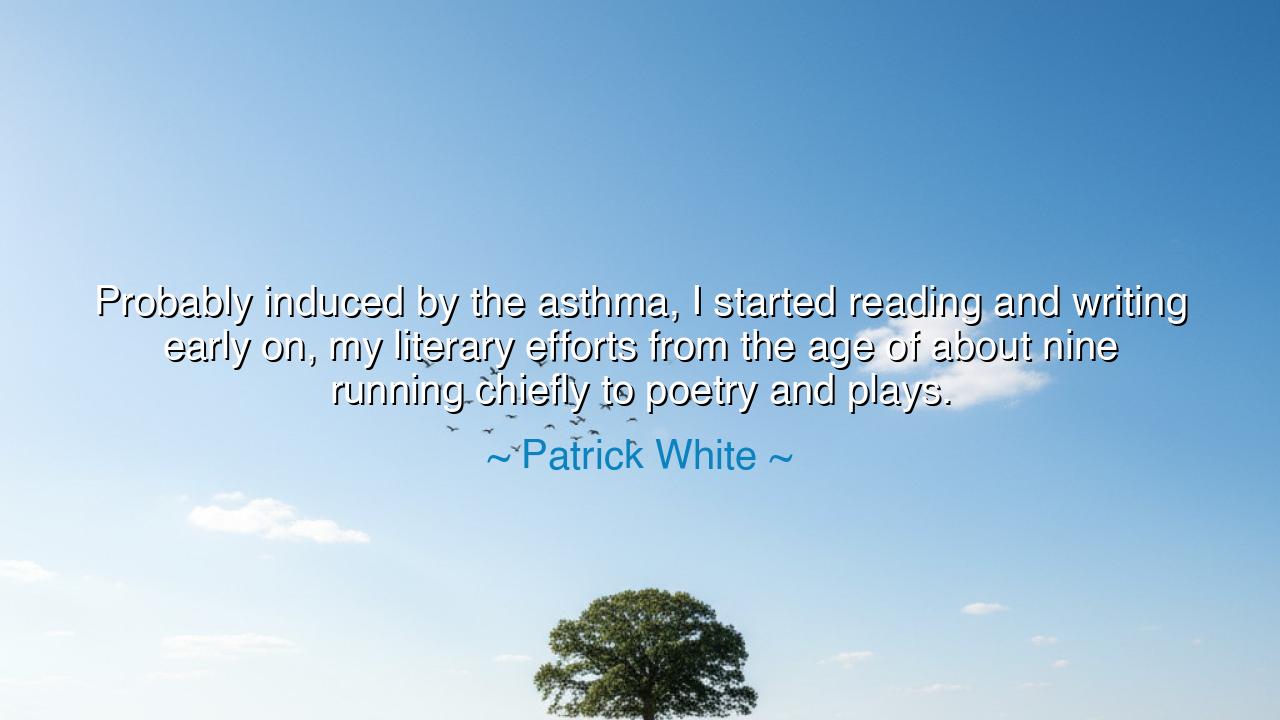
Probably induced by the asthma, I started reading and writing
Probably induced by the asthma, I started reading and writing early on, my literary efforts from the age of about nine running chiefly to poetry and plays.






“Probably induced by the asthma, I started reading and writing early on, my literary efforts from the age of about nine running chiefly to poetry and plays.” Thus speaks Patrick White, the Nobel Prize–winning Australian novelist, recalling the frail beginnings of a mighty voice. In this reflection he reveals how suffering can be a strange gift, for what the body denied him in strength, the mind transformed into imagination. Confined by illness, he turned inward, and there he discovered the treasures of words.
The meaning of this saying lies in the mystery of how hardship shapes destiny. White’s asthma, a weakness of the flesh, forced him into solitude. Yet solitude became the crucible of his genius. While other children might have run freely in fields, he roamed instead through the landscapes of thought, creating poetry and plays that gave form to his imagination. What seemed at first a limitation became the root of his greatness. His words remind us that human suffering often carries within it the seed of transformation.
The origin of his path is echoed in many lives. The poet John Milton, when struck blind, might have surrendered to despair, yet he dictated Paradise Lost, creating one of the most enduring epics of the English language. The composer Beethoven, deaf in his later years, wrote symphonies that shook the heavens. So too Patrick White: though plagued with weakness from his youth, he fashioned his own world with pen and page, proving that art can grow from affliction as roses grow from thorns.
Consider the boy of nine, scratching words onto paper while gasping for air. He was not merely passing time, but learning early that art is both escape and salvation. His poetry allowed him to breathe in spirit what his lungs denied him in body. His plays gave him the chance to create voices where he himself could not run to join the world of children. Out of the silence of illness, he summoned characters, rhythms, and images that would later carry him to the heights of literature.
The lesson for us is powerful: do not despise the burdens that life places upon you, for they may lead you to your calling. Illness, loneliness, rejection—these can be the very fires that forge creativity and resilience. What matters is not whether the path is smooth, but whether we turn our trials into strength. Like White, we may discover that our greatest limitations are the soil in which our destiny takes root.
Practically, this means we should learn to transform adversity into creation. If you are confined, turn confinement into reflection. If you are silenced, turn silence into writing, painting, or song. Begin early, as White did, or begin late—it matters not. What matters is to let hardship teach you, not defeat you. In this way, even pain can become a teacher, and struggle a companion toward greatness.
Thus the teaching endures: Patrick White’s asthma pushed him into the world of reading, poetry, and plays, and from those beginnings came a voice that would one day be crowned with honor. Let us remember that genius does not always rise from strength—it often rises from weakness transformed. And so we, too, must turn inward when trials come, for there, hidden in suffering, we may discover the first sparks of the fire we were born to carry.






HHHoang Huy
White’s early exposure to writing through his asthma is fascinating. I wonder how much of his later work was shaped by the themes of isolation or limitation that his illness likely imposed. Did these early experiences influence how he viewed the world? How do childhood experiences, particularly those that involve struggle, find their way into the creative works we produce later in life? It makes me wonder how many other writers have had similar origins in their creative journeys.
PLHo Phuc Lam
It’s interesting to think about how asthma, something so physically limiting, could have led White to discover his passion for writing. I wonder if it’s the solitude or introspection that often accompanies chronic illness that fosters creativity. How often do we see people turning to creative outlets as a way to channel their frustrations or emotions when they’re facing challenges beyond their control? Is there something about adversity that sharpens our creative faculties?
DDDung Duong
White’s story of beginning to write poetry and plays at a young age because of asthma is a reminder of how difficult circumstances can lead us to unexpected passions. Does this mean that hardships are necessary for creativity to flourish, or can creativity emerge from more neutral or positive experiences too? I think about how some of the most influential writers have turned personal challenges into their artistic voice. Is this pattern universal?
MHNguyen Minh Hai
White’s early interest in poetry and plays, seemingly driven by his asthma, brings up an intriguing question—does suffering or limitation often fuel creativity? Can physical limitations spark more intellectual or artistic exploration? I wonder if his asthma made him more attuned to the emotional and imaginative aspects of writing, or if it was simply a way to escape his reality. What role does physical discomfort play in the creative process?
TBHa Tran ba
The fact that White started writing so early in life shows how formative experiences can shape our creative paths. I’m curious how his experience with asthma influenced his writing style. Did it make him more introspective or focused on the internal world? How do other personal struggles shape a writer’s work? I think it’s interesting how health or personal challenges often lead to some of the most profound creative expressions.